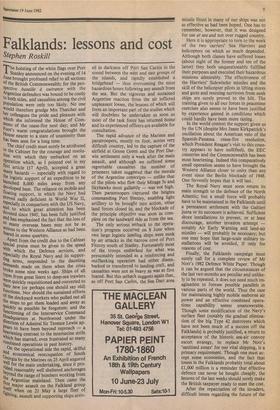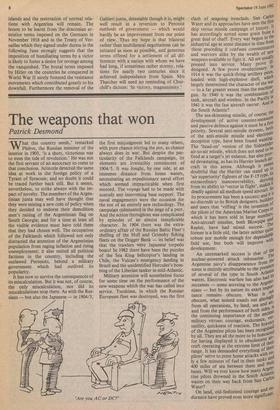Falklands: lessons and cost
Stephen Roskill
The hoisting of the white flags over Port Stanley announced on the evening of 14 June brought profound relief to all sections of the British Commonwealth; for the pro- spective bataille a outrance with the Argentine defenders was bound to be costly to both sides, and casualties among the civil Population were only too likely. No one Would therefore grudge Mrs Thatcher and her colleagues the pride and pleasure with Which she informed the House of Com- mons of the cease-fire next day; and Mr Foot's warm congratulations brought the
has nearer to a state of unanimity than ilas been seen for a long time.
The chief credit must surely be attributed to the Cabinet for the courage and resolu- tion with which they embarked on an °Peration which, as I pointed out in my first article (17 April), accepted a great tlikanY hazards — especially with regard to f Ile logistic support of an expedition to be launched 8,000 miles away from any developed base. The reliance on mobile and floating support, in which the Navy had roved sadly deficient in World War II, especially in comparison with the US Navy, and to which great attention has been devoted since 1945, has been fully justified and has emphasised the fact that the loss of s° many overseas bases may not be as !enous to the Western Alliance as had been `eared in some quarters. Apart from the credit due to the Cabinet special praise must be given to the speed With which the Defence services, and sPecially the Royal Navy and its suppor- ting arms, responded to the daunting demands made on them when the crisis L itoke some nine weeks ago. Ships of all types from great liners to deep-sea trawlers ,i_ete quickly requisitioned and converted to ',lien. new (or perhaps one should say old) funtions. Nor should the sustained efforts ,(If the dockyard workers who pulled out all Lae stops to get them loaded and away as Quickly as possible be forgotten; and the functioning of the Interservice Command teadquarters at Northwood under the rection of Admiral Sir Terence Lewin ap- pears to have been beyond reproach a heartening contrast to the internecine strife Which has marred, even frustrated so many combined operations in past history. On the operational side the rapid, skilful 4114 economical reoccupation of South Georgia by the Marines on 25 April augured 7.ell for the main undertaking, since it pro- vided reasonably well sheltered anchorages `teYond the range of bombers working from first Argentine mainland. Then came the itlfwh major assault on the Falkland grup seken on 21 May a large fleet of fighting, assault and supporting ships arriv-
ed in darkness off Port San Carlos in the sound between the west and east groups of the islands, and rapidly established a bridgehead — thus overcoming the most hazardous hours following any assault from the sea. But the vigorous and sustained Argentine reaction from the air inflicted unpleasant losses, the lessons of which will form an important part of the studies which will doubtless be undertaken as soon as most of the task force has returned home and its experienced officers are available for consultation.
The rapid advance of the Marines and paratroopers, mostly on foot, across very difficult country, led to the capture of the airfield at Goose Green and the Port Dar- win settlement only a week after the main assault, and although we suffered some regrettable casualties the number of prisoners taken suggested that the morale of the Argentine conscripts — unlike that of the pilots who flew their Mirage 5s and Skyhawks most gallantly — was not high. Then paratroopers captured the heights commanding Port Stanley, enabling light artillery to be brought into action, other land forces closed in, and the blockade of the principle objective was soon as com- plete on the landward side as from the sea.
The only serious setback to the opera- tion's progress occurred on 8 June when two large logistic landing ships were sunk by air attacks in the narrow cove of Port Fitzroy south of Stanley. Fortunately most of the troops embarked for what was presumably intended as a reinforcing and outflanking operation had either disem- barked or transferred to landing craft, and casualties were not as heavy as was at first feared. But this setback suggests again that, as off Port San Carlos, the Sea Dart area
missile fitted in many of our ships was not as effective as had been hoped. One has to remember, however, that it was designed for use at sea and not over rugged country.
Here it is appropriate to turn to the work of the two carriers' Sea Harriers and helicopters on which so much depended. Although both classes have suffered losses (about eight of the former and ten of the latter) they both unquestionably fulfilled their purposes and executed their hazardous missions admirably. The effectiveness of the Harriers' Sidewinder missiles and the skill of the helicopter pilots in lifting stores and guns and rescuing survivors from sunk ships are surely proved to the hilt. The training given to all our forces in peacetime exercises also seems to have been justified by experience gained in conditions which could hardly have been more taxing. In the world context the support given us by the UN (despite Mrs Jeane Kirkpatrick's oscillation about the American veto of the Spanish-Panama cease-fire resolution, which President Reagan's visit to this coun- try appears to have nullified), the EEC countries and the Commonwealth has been most heartening. Indeed this comparatively small operation seems to have brought the Western Alliance closer to unity than any event since the Berlin blockade of 1948. One fervently hopes that it will last.
The Royal Navy must soon return its main strength to the defence of the North Atlantic; but a small force will probably have to be maintained in the Falklands until a permanent settlement with the Galtieri junta or its successor is achieved. Sufficient shore installations to prevent, or at least discourage, another invasion attempt notably Air Early Warning and land-air missiles — will probably be necessary; but one may hope that large-scale military in- stallations will be avoided, if only for reasons of cost.
Finally, the Falklands campaign must surely call for a complete review of Mr Nott's 1982 Defence White Paper. Though it can be argued that the circumstances of the last two months are peculiar and unlike- ly to be repeated, it does not need much im- agination to foresee possible parallels in various parts of the world. Thus the case for maintaining highly mobile seaborne air power and an effective combined opera- tions capability seems unanswerable. Though some modification of the Navy's surface fleet (notably the gradual elimina- tion of the big Type 42 destroyers which have not been much of a success off the Falklands) is probably justified, a return to acceptance of the historic sea-air convoy escort strategy, to replace Mr Nott's 'sanitised zones' for our vital shipping, is a primary requirement. Though one must ac- cept some economies, and the fact that losses in the Falklands probably total about £1,000 million is a reminder that effective defence can never be bought cheaply, the lessons of the last weeks should surely make the British taxpayer ready to meet the cost.
After the repatriation of the invaders, difficult issues regarding the future of the islands and the restoration of normal rela- tions with Argentina will remain. The lesson to be learnt from the draconian ar- mistice terms imposed on the Germans in November 1918 and in the Treaty of Ver- sailles which they signed under duress in the following June strongly suggests that the imposition of humiliating terms by a victor is likely to foster a desire for revenge among the vanquished. The brutal terms imposed by Hitler on the countries he conquered in World War II surely fostered the resistance movements which contributed greatly to his downfall. Furthermore the removal of the Galtieri junta, detestable though it is, might well result in a reversion to Peronist methods of government — which would hardly be an improvement from our point of view. Thus my hope is that bilateral rather than multilateral negotiations can be initiated as soon as possible, and generous terms offered for a settlement of all dif- ferences with a nation with whom we have had long, if sometimes rather stormy, rela- tions for nearly two centuries since it achieved independence from Spain. Mrs Thatcher will need no reminding of Chur- chill's dictum: 'In victory, magnanimity.'





































 Previous page
Previous page